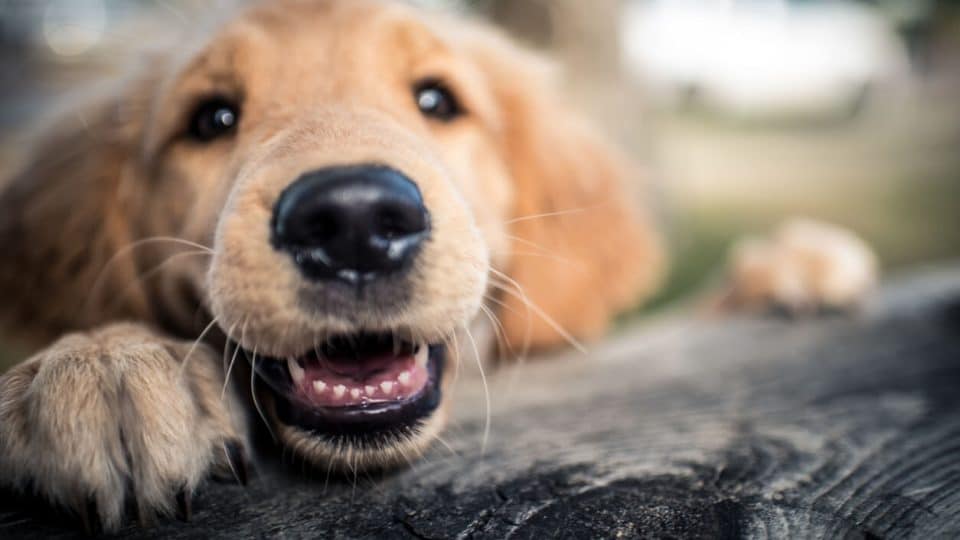A dog’s nose has two nostrils, just like yours does—but the similarities between dog and human noses mostly end there.
For starters, it’s completely natural for dogs to have a wet nose, due to their nasal secretions and licking. Your nose, on the other hand, might only get ‘wet’ when you’re sick.
The moisture on your dog’s nose plays an important role in their scenting abilities. Dogs breathe in scents and process them in different ways than people do, and they need their noses to navigate their surroundings. This helps explain why they smell everything!
A dog’s nose has about 300 million olfactory receptors, 50 times more than a human’s nose, to help them catch all those scents.
Read on to learn why dogs have wet noses, along with some myths about this trait.
Should My Dog’s Nose Be Wet?
Three main factors cause a dog’s nose to become wet, explains Dr Nell Ostermeier, veterinarian and veterinary spokesperson at Figo Pet Insurance.
1. Nasal secretions
Dogs naturally produce mucus, just like you do. Their nostrils excrete this mucus, which creates a thin, film-like covering over the nose.
Respiratory infections may increase the amount of mucus in your dog’s nasal area. While dogs can’t contract the virus that causes the human cold, they can get illnesses that cause similar symptoms, including a runny nose.
Dr Ostermeier says it’s important to contact your vet right away if you notice excessive nasal discharge or mucus from your dog’s nose, or if the mucus is thick and green or yellowish.
2. Licking
Dogs have much longer tongues than people do, and a dog’s tongue can easily reach their nose.
You generally don’t need to worry about your dog licking their nose from time to time, since they may do this to keep it clean or to help ‘push in’ scent molecules.
Frequent nose licking, however, can be a sign of a health concern, including dental disease or compulsive behaviours. If your dog seems to be licking their nose much more often than they typically would, it may be a good idea to talk to your vet.
3. The environment
If you’ve headed out for an early morning walk in the dew or a run in the rain, your dog’s nose can become wet as they explore and sniff wet things around them. And of course, they’ll probably end up with a wet nose after splashing in a pool or getting overly excited at their water bowl!
Does A Wet Nose Have Benefits For Dogs?
Mucus plays an important part in overall health and wellness. It helps keep tissues in the body moist, and it also helps filter unwanted germs, acting as a ‘glue’ to catch and hold them so they can pass out of the body.
In dogs, mucus also helps enhance their super sense of smell. The mucus that sits in a thin layer on your dog’s nose helps enhance the absorption of scent chemicals, which boosts their sense of smell, Dr Ostermeier explains.
A wet nose also helps keep your dog from overheating. As the moisture evaporates, it helps your dog stay cool.
What Factors Affect A Dog’s Nose Moisture?
Your dog will often have a wet nose, but you don’t necessarily need to worry if the tip of their snout seems dry!
“A dry nose may be normal for some dogs,” Dr Ostermeier says. She adds that you’ll want to talk to your vet if your dog’s nose is dry with redness, cracking, or bleeding. They may have an underlying health concern causing these issues. If that’s the case, your vet can help pinpoint the cause and recommend the right treatment.
A few factors that can influence the moisture on your dog’s nose include:
- Breed. “A dry nose may be more common in brachycephalic breeds, like a Pug or Boxer,” Dr Ostermeier says. “This is due to the shape of their nasal passage and face.”
- Age. “Some dogs will develop a dry nose as they age,” Dr Ostermeier says.
- Environment. Just as running around in the rain will cause your dog’s nose to get wetter, hot or windy weather can leave your dog’s nose drier than usual.
3 Common Myths About A Dog’s Wet Nose
There are plenty of myths about dogs, like the idea that they’re colourblind. Some of these myths are about their noses and what it means when a dog’s nose is wet or dry.
Dr Ostermeier debunks three of these myths below.
1. A dog’s nose is a good way to assess their body temperature
If your pup’s nose feels cold to the touch, you might think they’re feeling chilly, but that’s not necessarily the case. “If your dog is acting normal, then there is no cause for concern whether their nose is hot and dry or cold and wet,” Dr Ostermeier says. If you get your hands wet and wave them around, the moisture will quickly start to feel cool—the same goes for your dog’s nose!
2. A dog’s nose is a good way to monitor their overall hydration
“A wet or dry nose is not a good indicator of your dog’s health,” Dr Ostermeier says. She explains that while a dry nose may point to dehydration, dryness isn’t a tell-tale sign. “Some dogs may be dehydrated and still have a moist nose,” she says. A dry nose isn’t the only sign to consider when checking for dehydration. Other signs to pay attention to include excessive panting, low energy, dry gums, and loss of appetite.
3. A wet nose means your dog is healthy
“Your dog is a complex living being,” Dr Ostermeier says. She adds that the status of their nose is only one sign to consider when it comes to their overall health and wellbeing.
If you have any concerns about your dog’s nose, or other possible health concerns, your vet can offer more guidance—and pet insurance can help make your vet visit more affordable!




